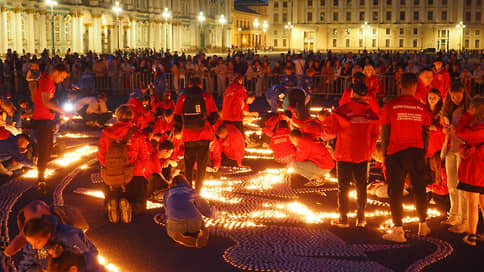The Expert Institute for Social Research held a round table “SVO: lessons learned from history”
[ad_1]

On the Day of Remembrance and Sorrow, June 22, the Expert Institute for Social Research held a round table “SVO: lessons learned from history.” Its participants proceeded from the thesis that Russia’s military operation in Ukraine was launched with the aim of confronting the same geopolitical forces with which the Soviet state fought in 1941-1945. But thanks to the very “lessons learned”, the Russian authorities reacted preemptively, experts considered. However, according to them, the population of Russia is not accustomed to the fact that their state acts “proactively”, and this thesis needs more thorough explanatory work. At the same time, it turned out that, despite the call to resist the West, EISI experts do not separate Russia from Western civilization.
According to the director of the Historical Memory Foundation, researcher at the Institute of Russian History of the Russian Academy of Sciences Alexander Dyukov, Russia’s geopolitical opponents are again preparing for June 22. This is evidenced, in particular, by the statement of German Chancellor Olaf Scholz about the constant active financing of Ukraine by Germany and Moldova’s refusal to celebrate May 9th. These, according to Mr. Dyukov, are signs of “active rewriting of history” of the Great Patriotic War by Russia’s opponents. “The meaning of the policy of the EU and the USA in the post-Soviet space lies in the consistent support of ethno-nationalism, the consistent support of ethnocracy,” continued Mr. Dyukov. “It is aimed at revising history, revising the memory of the Great Patriotic War. It is on the substratum of ethno-nationalism that what we now see in Ukraine grew up.” The current situation, coupled with other risk factors, prompted Russia to start a military operation, Pavel Danilin, director of the Center for Political Analysis, added to his colleague.
However, the logic of the Russian authorities is not fully understood by all citizens, the expert of the Center for Applied Research and Programs Petr Skorobogaty continued. According to his observations, Russians are most acutely concerned about the moments related to the role of the initiator of the combat phase of the conflict: “It is very important for people to understand that it was a preventive strike that was delivered, that we responded, and did not start a military defense.” Mr. Skorobogaty added that Russians are historically not accustomed to the “proactive” role of their state in the geopolitical arena. Also, additional explanatory work among the Russians requires, in his opinion, the ideology of the Ukrainians: “There is no firm confidence (among the Russians.— “b”) in the fact that Ukraine has embarked on the path of Nazism or nationalism … The term “neo-Nazis” has not taken root among the people. This, according to the expert, is due to the fact that professional, friendly and family ties remain between the citizens of the Russian Federation and Ukraine.
“If people say that they will kill, believe them,” Maxim Grigoriev, director of the Foundation for the Study of Democracy Problems, joined in. “People on the Euromaidan did not hide at all that they would kill, cut Russians. That the Russians are enemies for them, that they see Ukraine the way the OUN and Bandera bequeathed. Then they should have believed in it and taken appropriate steps.” According to Mr. Grigoriev, the ICR is currently investigating more than 3,000 relevant criminal cases, and public figures have been recording tragic eyewitness accounts since 2014. “Of course, it is clear that the West is behind this,” Mr. Grigoriev stated. “The ideas of Nazism, the ideas of the superiority of the Western race, the white man… Western countries killed more people than the Nazis. The Nazis are a short period, and Western countries (killed.— “b”) for several centuries.
According to Alexander Dyukov, the information background of what has been happening since 2014 in Ukraine was set, among other things, by structures that received foreign funding, which were just working on the historical memory of the population. “A huge number of publications that were in every school, every library,” Mr. Dyukov said. “They were dedicated not only to Bandera or Shukhevych, these publications were dedicated to the heroes of the Maidan, the heroes of the “anti-terrorist operation”, schoolchildren and students studied on their examples. It was a consistent activity.” The beneficiaries of the process introduced to the Ukrainian population the theses about “Russian aggression, about the existential hostility of Russia, created a number of localized national heroes who fought against aggression and died from it,” said Mr. Dyukov. “Unfortunately, the events of 2022 showed how effective this was, when, no matter how much we wanted it, the Armed Forces of Ukraine and other formations of the Ukrainian regime did not disperse,” he concluded and called for more active borrowing of effective schemes of ideological work.
Despite the call to resolutely oppose the West, experts not only allow peaceful interaction with Western civilization, but also do not separate Russia from it. “None of us has ever said that Western civilization as such is immanently hostile to the Russian Federation,” Pavel Danilin, the moderator of the event, director of the Center for Political Analysis, said in response to a relevant question from Kommersant. “I’ll tell you more: it is the Russian Federation that is the bearer of those ideals and values by which Western civilization lived. According to Mr. Danilin, these ideals lie in traditional values, which “we talk about all the time” and which “the West for some reason refuses”: “In Western civilization, of course, they look at this very differently. There are groups that support this satanic bacchanalia, there are groups that are shocked by all this, but cannot say, and there are those who speak. We’re starting from that.”
[ad_2]
Source link








